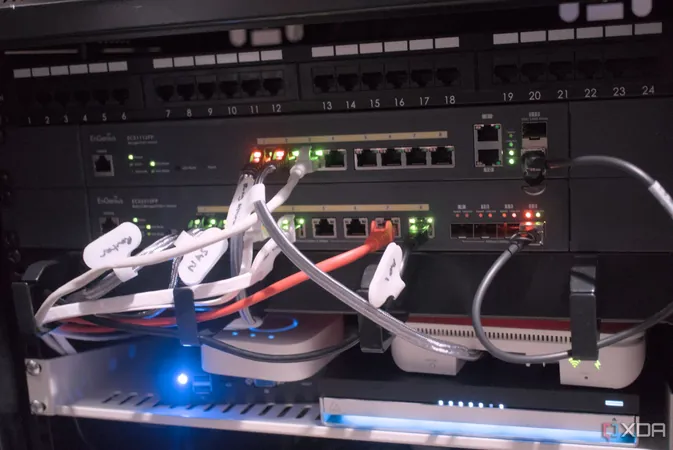
4 Compelling Reasons to Consider a High-Speed LAN Setup for Your Home Network
2025-01-01
Author: Ming
In today's digital era, upgrading your local network speed might seem unnecessary for some, but for others, it can be a game-changer. If your household or workspace demands higher bandwidth for various applications, investing in high-speed LAN technology can become essential. The reasons for boosting your network can be categorized primarily into two key areas: raw speed and overall throughput.
If you're managing extensive applications with numerous users—be it a robust media server, a VPN service, or an online gaming server—you might quickly exceed the capabilities of standard ISP-provided equipment. Moreover, if your work entails transferring large files on a consistent basis—whether you’re a content creator dependent on NAS solutions for media editing or simply managing large databases—then faster speeds will optimize your efficiency.
Here are four strong reasons to consider upgrading your local network to a high-performance LAN setup:
1. Lightning-Fast File Transfers
The most straightforward benefit of a high-speed network is the dramatic increase in transfer speeds. For users frequently moving large files between devices or managing extensive databases, this can equate to a significant improvement in productivity. For instance, if you’re using a local cloud storage system or gaming platform like Steam, local file transfers can help save your internet bandwidth and accelerate downloads by allowing faster data movements across connected devices. The advantages extend beyond simple transfers—if you are executing backups for a home lab like Proxmox, upgrading to a higher performance LAN can mitigate transfer times considerably, facilitating seamless operations.
2. Future-Proofing Your Connection
Upgrading to a multi-gig LAN setup not only enhances your current speed but ensures your network is ready for future high-speed internet options. With the rise of multifaceted broadband packages, it's wise to be proactive in supporting the fastest available connections. While many home routers provided by ISPs support speeds beyond 1 Gbps, you need to ensure internal network equipment—like switches and cabling—can handle multi-gig speeds as well. By doing so, you’re not just reacting to current needs but strategically preparing for technological advancements.
3. Enhanced Backup Efficiency
Regular backups are crucial, but they can often sap network resources, slowing down other operations. With a high-speed LAN setup, backup processes can happen significantly faster, limiting the disruption they cause. This advantage is especially beneficial for automated backups, letting you move files rapidly without interfering with daily network performance. Faster backups also contribute to quicker disaster recovery, meaning critical data restoration processes can come to fruition in less time, a key factor in maintaining operational continuity.
4. Optimize Your NAS Performance
Investing in high-performance storage solutions like NVMe NAS is a savvy decision, but if your network can't keep up, you might be wasting your investment. SATA SSDs can operate within the bandwidth of a gigabit connection, but when dealing with high-speed NVMe units, you may encounter network bottlenecks that restrict performance. Testing local transfer speeds is an easy way to identify these limitations. If your tests show that your network is the performance hindrance, then upgrading to multi-gig configurations is vital to fully harness the capabilities of your cutting-edge storage solutions.
Conclusion: Is a Multi-Gig Setup Right for You?
Consider your specific network needs before investing in a high-speed LAN upgrade. If your bandwidth demands justify the cost—whether in terms of financial spend or time investment—you'll be well equipped to enjoy a significantly improved network performance. While not everyone may require such high speeds, for those that do, a multi-gig setup can be transformative. Evaluate your workload and future-proof your network—this upgrade might be more crucial than you think!



 Brasil (PT)
Brasil (PT)
 Canada (EN)
Canada (EN)
 Chile (ES)
Chile (ES)
 Česko (CS)
Česko (CS)
 대한민국 (KO)
대한민국 (KO)
 España (ES)
España (ES)
 France (FR)
France (FR)
 Hong Kong (EN)
Hong Kong (EN)
 Italia (IT)
Italia (IT)
 日本 (JA)
日本 (JA)
 Magyarország (HU)
Magyarország (HU)
 Norge (NO)
Norge (NO)
 Polska (PL)
Polska (PL)
 Schweiz (DE)
Schweiz (DE)
 Singapore (EN)
Singapore (EN)
 Sverige (SV)
Sverige (SV)
 Suomi (FI)
Suomi (FI)
 Türkiye (TR)
Türkiye (TR)
 الإمارات العربية المتحدة (AR)
الإمارات العربية المتحدة (AR)